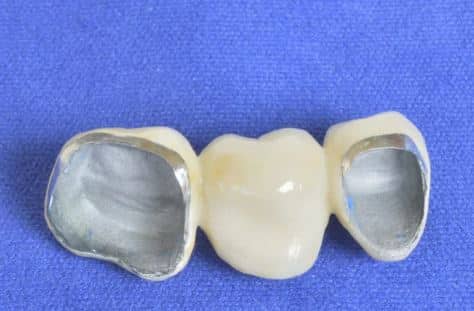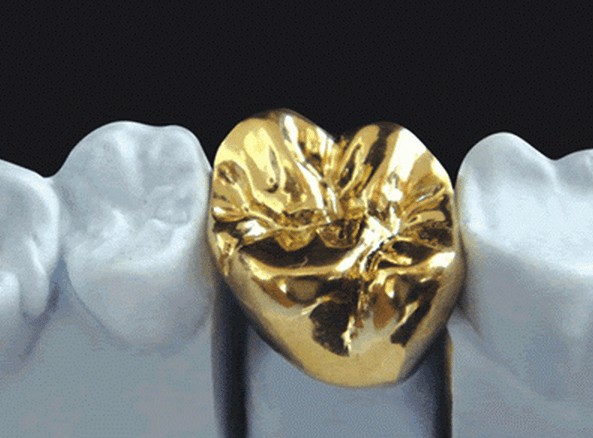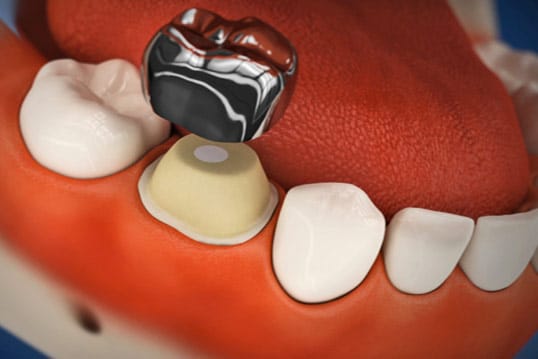In dentistry, a dental crown is a type of dental restoration which covers a tooth. A crown maybe needed for a variety of reasons ranging from tooth fracture, tooth decay or worn out so as to restore the structure and function of the tooth.
There are different types of dental crowns depending on the materials used to fabricate the crown.
More: Operculectomy
Indications for dental crowns
Dental crowns are indicated for the following reasons:
- Restorative – Crowns are used to restore the form, function and appearance of worn or fractured teeth.
- Aesthetics – Crowns improve the aesthetics of unsightly teeth.
- Maintenance – Crown maintains the structural durability of teeth.
- Replacement – A crown maybe indicated to replace existing crows which have failed.
More: Jaw Reduction Surgery
Types of Dental Crowns
There are five types of dental crowns available based on the materials to be used. They include:
- Porcelain-Fused-to-Metal Crowns

Porcelain-Fused-to-Metal Crowns
Porcelain fused to metal crowns are often used to restore teeth that are severely damaged or decayed. The most common restorative material for dental crowns and bridges is a mixture of porcelain and metal. When porcelain and metal are heated together, the porcelain chemically fuses to the oxides on the metal, which creates a durable bond.
Porcelain-fused-to-metal crowns are stronger than regular porcelain because they are supported by a metal structure. They also blend in well with the shape, look, and function of the natural teeth.
- Metal Crowns & Gold Alloys

Gold dental crown
Metal crowns come in a few different forms and colors. They provide a strong bond, are fracture-resistant, and do not wear away teeth. These crowns typically consist of gold, copper, and other metals. Some metal crowns are made of non-noble metals, which are very strong and corrosion-resistant.
Crowns require the removal of tooth structure before placement. Metal-based crowns require the least amount of removal, making them a more conservative option.
- Stainless Steel Crowns

Stainless steel crowns have been used from 1940 are only used to restore primary or milk teeth. Stainless steel crowns are placed after pulpotomy treatment or when normal cavity fillings, such as amalgam fillings, are likely to fail.
They are very durable, corrosion resistant and are advantageous in protecting the decayed tooth of children.
- Ceramic Crowns
Ceramic crowns are made of porcelain. In dentistry, porcelain is used to create tooth-colored dental materials, such as cosmetic crowns, that mimic the look, shape, and function of natural teeth.
Cosmetic crowns restore anterior (front) teeth and blend in with your natural tooth color. They are strong, durable, and do not chip or break easily. The most common alternative to all-ceramic crowns is “zirconia,” which is actually a metal.
- All-Resin Crowns
As the name implies, the crown is entire made out of resin material. Resin is a thinner and more fragile material than other dental restorations, such as metal and porcelain. Resin restorations are only used on decayed baby teeth, rather than permanent teeth.
Also, they are used as a temporary measure, protecting the tooth or filling until the permanent crown has been manufactured.
Dental Crowns Cost
The cost of dental crowns varies according to the type of dental crown. Also, it depends on factors such as anesthetic fee, private hospital fee, and extent of dental restoration required.
The prices below reflect the cost of a dental crown without insurance:
Porcelain-Fused-to-Metal Crowns — $875-$1400 (per tooth)
Ceramic (Porcelain) Crowns — $800-$3000 (per tooth)
Metal and Gold Crowns — $800-$1400 (per tooth)
Stainless Steel Crowns — $300-$500 (per tooth)
All-Resin Crowns — $600-$1300 (per tooth)
In conclusion, dental crowns are good for restoring the form and function of decayed, worn or fractured tooth. The cost of dental crowns depends on the materials used to fabricate the crown.
More: Types of Plastic Surgery


